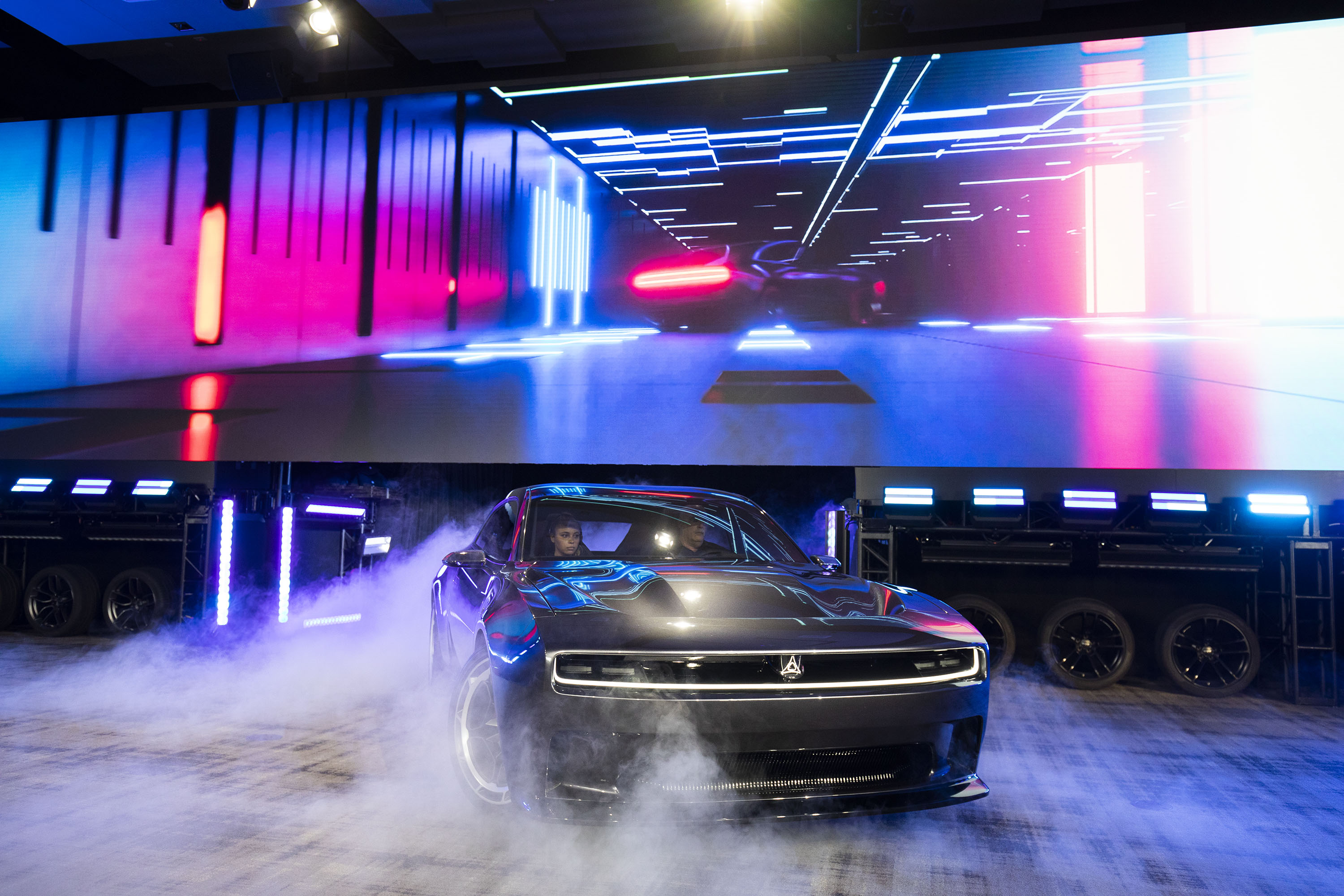Is the muscle car era ending?
Dodge introduces its last gas-powered muscle car. What's next?


A free daily email with the biggest news stories of the day – and the best features from TheWeek.com
You are now subscribed
Your newsletter sign-up was successful
The age of the gas-powered muscle car is nearly over. Dodge has unveiled its "last super-fast gasoline muscle car," as The Associated Press reports. The 2023 Challenger SRT Demon 170 can go from zero to 60 miles per hour in under two seconds — but it burns a lot of gas to get there: The vehicle gets just 13 miles per gallon in the city. You can just imagine the amount of climate-changing carbon emissions produced by such a machine, which is why they're going away: Just 3,300 Challenger Demons will be produced before the end of the year. After that? The Canadian factory where they're made will be converted to electric vehicle production. "It's the end of an era, for sure," said Tim Kuniskis, CEO of the Dodge brand. Why is the muscle car era ending? And what will replace them? Here's everything you need to know:
What are muscle cars?
There is a difference between a "muscle car" and a "sports car." Both are fast, but muscle cars tend to be a bit bigger and brawnier, which means you need to slow down at corners a bit more than if you're driving a smaller and more nimble sports car. Jim Gorzelany at Carfax writes that muscle cars are usually "rear-wheel-drive, two-door American production cars that are equipped with a large V8 engine, wide tires, flared fenders, and large hood scoops." Some classics of the genre include the 1970 Dodge Challenger, 1969 Chevrolet Camaro, and 1976 Pontiac Firebird Trans Am, according to the folks at Progressive, the insurance company. As those model years indicate, the heyday of the muscle car was the late 1960s and early 1970s, before the 1970s oil crisis made them unsustainable for most drivers.

Why are gas-powered muscle cars going away?
Climate change. "Unfortunately, two things that are seemingly mutually exclusive are muscle cars and sustainability," Dimitar Angelov writes at TopSpeed. Dodge actually revived the muscle car era in the early 2000s by reintroducing the Charger and Challenger models, but the company announced in August 2022 it was moving on. Why? "For several years, Kuniskis has warned that the end was coming for the gas-powered muscle cars due to emissions regulations," CNBC reports. Dodge's parent company, Stellantis — formerly known as FiatChrysler — "ranks the worst among major manufacturers for U.S. corporate average fuel economy and carbon emissions." As America attempts to reduce its carbon emissions and slow the pace of global warming, that simply won't do.
The Week
Escape your echo chamber. Get the facts behind the news, plus analysis from multiple perspectives.

Sign up for The Week's Free Newsletters
From our morning news briefing to a weekly Good News Newsletter, get the best of The Week delivered directly to your inbox.
From our morning news briefing to a weekly Good News Newsletter, get the best of The Week delivered directly to your inbox.
Will regulators take classic muscle cars off the road?
Some collectors of classic muscle cars worry about that possibility, but that probably won't happen. "It's nearly impossible to find industry experts or environmentalists who think such a ban would spell the end for classic cars," John D. Stoll writes for Hagerty, a company that insures classic cars. However, he notes that some large cities in the United States and abroad have looked into creating "zero emissions zones" where old-school Challengers and Camaros might not be welcome. There might be a solution for the owners of those cars: AP reports there is a "small but expanding group of tinkerers, racers, engineers and entrepreneurs" who are converting their old gas-powered muscle cars into electric vehicles. A 2022 survey of 25,000 enthusiasts found that about 1 percent had converted their classic cars to run on an electric engine.
Are EV muscle cars on the way?
Dodge certainly wants customers to think so. CNN reports that the company in 2022 unveiled a concept car, the Dodge Charger Daytona SRT, which looks a lot like the electric muscle car the company expects to produce in 2024. Notably, the car will do more than simply go real fast: "The Charger Daytona has exhaust pipes that make noise and a transmission that shifts gears." Neither of those features is necessary for an electric vehicle — but "excitement … requires more than fast acceleration." HotCars.com notes that the Dayton can be glimpsed in the trailer for Fast X, supposedly the final film in the Fast & Furious franchise.
Wait. Is it possible for EV cars to have real muscle?
That's the real question. And there's some skepticism out there. "The muscle car era [will] just fade on away unless they show us something mighty mighty good," The Wellborn Muscle Car Museum's Alton Freeman tells The Washington Post. Experts say the electric generation should be able to provide drivers with the get-up-and-go power they've come to expect from gas-powered muscle cars. But the experience might be different, Hagerty's McKeel Hagerty tells InsideHook: "It may not sound the same, it may not behave exactly the same, but the thrill it gives its drivers, passengers, and even bystanders is likely unmistakable."
A free daily email with the biggest news stories of the day – and the best features from TheWeek.com
Joel Mathis is a writer with 30 years of newspaper and online journalism experience. His work also regularly appears in National Geographic and The Kansas City Star. His awards include best online commentary at the Online News Association and (twice) at the City and Regional Magazine Association.
-
 Local elections 2026: where are they and who is expected to win?
Local elections 2026: where are they and who is expected to win?The Explainer Labour is braced for heavy losses and U-turn on postponing some council elections hasn’t helped the party’s prospects
-
 6 of the world’s most accessible destinations
6 of the world’s most accessible destinationsThe Week Recommends Experience all of Berlin, Singapore and Sydney
-
 How the FCC’s ‘equal time’ rule works
How the FCC’s ‘equal time’ rule worksIn the Spotlight The law is at the heart of the Colbert-CBS conflict
-
 Why the catastrophe bond market is growing
Why the catastrophe bond market is growingThe Explainer The bonds pay for climate change disaster damages
-
 Why are home insurance prices going up?
Why are home insurance prices going up?Today's Big Question Climate-driven weather events are raising insurers' costs
-
 Christmas trees: losing their magic?
Christmas trees: losing their magic?In the Spotlight Festive firs are a yuletide staple but are their days numbered?
-
 The ocean's blue economy is growing. Can the tide continue to rise?
The ocean's blue economy is growing. Can the tide continue to rise?The Explainer The big blue is bringing in the green
-
 The rise of the world's first trillionaire
The rise of the world's first trillionairein depth When will it happen, and who will it be?
-
 The surge in child labor
The surge in child laborThe Explainer A growing number of companies in the U.S. are illegally hiring children — and putting them to work in dangerous jobs.
-
 Your new car may be a 'privacy nightmare on wheels'
Your new car may be a 'privacy nightmare on wheels'Speed Read New cars come with helpful bells and whistles, but also cameras, microphones and sensors that are reporting on everything you do
-
 Empty office buildings are blank slates to improve cities
Empty office buildings are blank slates to improve citiesSpeed Read The pandemic kept people home and now city buildings are vacant
